
Everything You Need to Know About Police Community Support Officer (PCSO)
Are you looking to make a real difference for your local communities? Are you an upstanding citizen with a firm sense of duty and belief in upholding the law?
Becoming a Police Community Support Officer (PCSO), a visible and reassuring presence could be just the thing you are looking for. To answer these questions, read on.
Table of Contents
What Is a Police Community Support Officer?
Provide a more visible police presence and work alongside regular police personnel to reduce crime and make communities safer.
Police Community Support Officers PCSOs are out there on the streets, interacting with residents, assisting officers, reducing crime, handling traffic, developing the connections and relations that citizens and community leaders hold in high regard, And giving crime prevention advice.
What Does a Police Community Support Officer Do?
PCSOs often do duties such as aiding police officers, collecting information, conducting regular patrols and reassuring the public simply by their presence. They also attend to concerns that do not necessitate arrest and detention whenever possible.
Depending on the type, you may be given training and called upon to perform functions, such as:
- Assisting with ceremonial and special sports events.
- Responding to severe incidents as well as security alerts.
- Making door-to-door requests for information.
- The issuance of fixed-penalty notices.
- Performing house visits
Requirements for Becoming a PCSO
Age:
You must be 18 or over to apply to become a PCSO.
Education:
There are no formal educational criteria to become a PCSO, but you must have a good command of the English language. Some positions will necessitate a full driver’s license.
Nationality:
You can apply to be a PCSO if you are a foreign national. If you are not a British citizen, you must have indefinite leave to enter or remain in the UK. Members of the European Economic Area (EAA) are now required to have ILR or EU settled status due to legislative changes.
Training and Development:
Training is vital. It allows you to deal calmly and logically with whatever obstacles arise each day and serve your community confidently.
You will begin with six weeks of primarily classroom-based instruction, Monday through Friday. This will start introducing you to your new position while also assisting you in developing the necessary knowledge and skills.
You will be evaluated on what you’ve learned across the course. The test results and your overall performance will be used to identify any aspects you need to improve.
Police Community Support Officers
As police support officers, you can tackle crimes and antisocial behaviour within your community. Getting through this day brings challenges that are often challenging but also exciting for everyone involved.
You have the most important responsibility of assisting with patrolling and providing visibility on the streets at any given time as part of the recently introduced safer neighbours teams. PCOS supervisors and digital PSCs / NEOs work together to establish and strengthen good community relations.
What Makes a Good PCSO?
Someone who has committed himself to help their local town is interested in people and wants to learn what goes on.
You might be interested in social service, housing or volunteering at a charity. Perhaps you’re worried that the problems you see within your local neighbourhood are not suitable for young people, or you want to create the best possible environment.
You’ll need good communication skills, and previous experience dealing with the public in community-based settings will be a big help.
Flexible Work and Shift Enhancements
Your shift is 36 hours long. Rotation changes work between 8 a.m. and 1 a.m. seven days a week. You might be expected to work between 8 a.m. and 12 a.m. Those who patrol alone are required to do so.
Employees can combine work and other activities outside of work by using flexible working practices.
Each case is examined and evaluated on its own merits. Supervisors will consider all requests and make every effort to ensure that they are in accordance with operational needs.
Shift Patterns
Your shift’s start times will vary. “Early” shifts are typically from 8 a.m. to 3 p.m., but this varies by location because it is adapted to neighbourhoods. An additional four-week vacation may be taken for a minimum of 24 days.
The contracted hours are 36 hours per week, full time (no breaks). Because it is a 24-hour service, PCSOs are generally required to work a shift pattern that includes a mix of morning, daytime, evening, and night shifts.
The shift patterns vary from location to location, depending on the operational needs of that area.
Payment as a PCSO
Upon appointment, the starting salary is £119 032 p. a. Weekend work and shift enhancements can be provided, depending on hours worked. Successful applicants would usually be appointed below the pay level in an annual increment of £33,406 p.a.
Successful applicants are given a starting salary of £20,619 with a shift allowance for working long shifts and weekends, around £26,000.
They will be part of a local government pension scheme, have ongoing career and development opportunities and can access a range of lifestyle benefits, employee assistance and wellbeing support.
Career Path and Progression
There’s no formal pathway for Police community support officers to join the police force. However, the skills you learn could be helpful if you wish to move into these positions. Quite a few PCSOs have made being a community support officer their full-time job. You might also have the experience to begin mentoring or training new PCSOs.
Do You Have a Say in Where and When You Work?
You can apply to work full-time or part-time, depending on your circumstances. However, when it comes to agreeing on any individual flexible working requests, priority is given to operational and business needs.
And while you will ultimately be posted wherever you’re most needed, your location preferences will be considered when considering where to place you.
During the recruitment process, you will be asked for some preference information about where you’d like to be posted to help inform our decision making.
We cannot guarantee that we can accommodate your preferences as operational requirements will inform where we need to post new PCSOs. Still, we will endeavour to work with your preference where possible.
The Difference Between a PCSO and a Police Officer
The differences between the two are PCSOs have no powers of arrest and cannot interview or process prisoners or conduct investigations. They aren’t allowed to get engaged in the more complex and dangerous activities that police officers perform.
They also serve an even more valuable community role as deterrents as well as confidants.
Although PCSOs are no longer capable of arrest, they are capable of detaching someone if it is necessary. A policing officer may have specific authority in areas like smoking and drinking, transport and fixed penalty notice.
What Could You Experience as a PCSO?
PCSOs’ lives as part of a neighbourhood policing team vary from small tasks to major incidents and immediate response calls. NO two days are the same.
How to Apply
- Submit your application form to the relevant police constabulary.
- Your eligibility will first be verified. You will then be asked to come in for a selection interview if you fulfil the requirements. This could include a question and answer session, a written evaluation, and a role-playing exercise.
- You will be suggested for a nomination following the selection interview, subject to some reference and security screening.
- The duration of the application varies among individuals, based on their particular conditions.
Final Thoughts
The role of a PCSO is unlike any other; it is a once-in-a-lifetime opportunity to work for a forward-thinking organisation that is available all year round to interact, assist, and serve the communities. You will provide an exceptional service to your community members, collaborate with police staff and gain a fulfilling new career.
Relevant Post
Police Scotland Entrance Test (PSET)
Sarah is an accomplished educator, researcher and author in the field of testing and assessment. She has worked with various educational institutions and organisations to develop innovative evaluation methods and enhance student learning. Sarah has published numerous articles and books on assessment and learning. Her passion for promoting equity and fairness in the education system fuels her commitment to sharing insights and best practices with educators and policymakers around the world.





